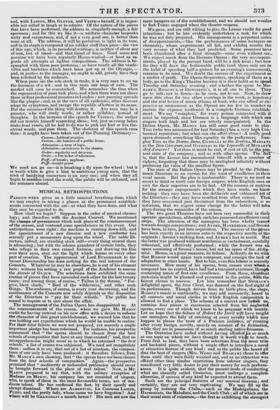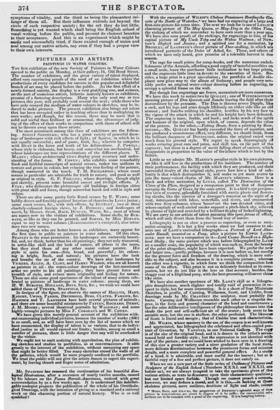MUSICAL RETROSPECTIONS.
PASSION-WEER gives us a little musical breathing-time, which we may employ in taking a glance at the prominent establish- ments connected with the art—at what they have done, and what they may be expected to do. How shall we begin? Suppose in the order of musical chrono- logy; and therefore with the Ancient Concert. We mentioned the change of government which took place at the commencement of the season, and ventured some speculations on this event. Our anticipations were right : the machine is running down-hill, and the appointment of a new director and, a new conductor has scarcely put a momentary drag upon the wheel. The noble Di- -rectors, indeed, are standing stock still—every thing around them is advancing ; but with the solemn grandeur of certain birds, they take refuge in their own ruined fortress, and drawing the film over their eyes, shut out the light which beams on every other part of creation. The appointment of Lord. BURGHERSH to the vacant Directorship has done nothing for the real interest of the Concerts. Whatever he may be elsewhere, he is out of his element here: witness his setting a raw pupil of the Academy to rescore the Alceste of Geuea. The selections have exhibited the same routine of pieces that have succeeded each other for the last twenty years; and among them, of course, " Fallen is thy throne," "For- give, blest shade," " Bird of the wilderness," and other such things. The audience, of course, is every year decreasing, and the continuance of the Concerts now solely depends on the disposition of the Directors to " pay for their whistle." The public has ceased to inquire or to care about the affair. The management of the Italian Opera has disappointed us. At the commencement of the season, when we gave Mr. MASON credit for having entered on his new office with a desire to redeem the character of this great establishment, we warned him that he was holding out expectations which he would be unable to realize. For their total failure we were not prepared, yet scarcely a single important pledge has been redeemed. For instance, his prospectus announced that " the operas should be chosen from the best schools of composition that have at any time existed ;" and, that no misapprehension might occur as to which he esteemed " the best schools," a list of names was subjoined. We need not recapitulate them : suffice it to say, that out of a list of nineteen, the composi- tions of one only have been produced : it therefore follows, from Mr. MASON'S own showing, that " the operas have not been chosen from the best schools of composition." Again—the prospectus promised that " mediocrity or unfounded pretension should never be brought forward in the place of real talent." Now, is Mr. MASON prepared to say that, with the solitary exception of Madame DE MERIC, his company has not consisted of singers, who, to speak of them in the most favourable terms, are of me- diocre talent. He has confessed the fact, by their speedy and abrupt dismissal. Where are ALBERTINI, La Contessa Lame, Pune and the portly lady. whose name we have forgotten? And where will be GRANDOLFI a month hence? His men are now the mere hangers-on of the establishment, and we should not wonder to find TORRI engaged when the theatre reopens.
We gave, and are still willing to give the Lessee credit for good intentions ; but he has evidently undertaken a task for which he was not duly prepared. His management is a perpetual series of disappointments,—like the performances of some lecturers on chemistry, whose experiments all fail, and exhibit results •the very reverse of what they had predicted. . Some promises have been abandoned after a faint struggle—some even without one.. We expect much from the German Operas : the very accompani- ments, played by the present band, will be a rich treat ; but how far they will draw the fashionable public (and these only are in the habit of spending half-a-guinea for an evening's amusement), remains to be tried. We doubt the success of the experiment as a matter of profit. The Opera-frequenters, speaking of them as a body, go to the King's Theatre because it is their habit so to spend Tuesday and Saturday evening ; and whether the opera be MCS ZART'S, ROSSINI'S, or Doenzerres, it is all one to them. They- go to talk, not to listen—to be seen, not to see. Now, to draw upon this class for two other evenings in the week, is hopelesS I. and the real lovers of music (those, at least, who can afford so exe pensive an amusement as the Opera) are too few in number to sustain the expense incidental to a complete German establish mint. We say " complete," for every person connected with it must be imported, since German is a language with which our singers both high and low are utterly unacquainted. In the Italian Opera, Mr. MASON has still some good cards to play. nisi (who was announced for last Saturday)'has a very high Con- tinental reputation ; but what can she effect alone ? A really good opera demands something like equality in the performers. Ima:- gine Tost as the Donna Anna, CASTELLI as the Zerlina,MAaatfi as the Don Giovanni, and GIUBILEI as the Leporello of lgozateih chef d'oeuvre! Yet thus it must be cast, if cast at all, in the pre,. -sent state of the company ; and so with other Operas. The fa-Sr-- is, that the Lessee has encumbered himself with a number of ciphers, forgetting that these may be multiplied infinitely without producing the value of the smallest figure.
The state of the Italian Opera may be pleaded by the Philhar- monic Directors as an excuse for the want of excellence in their vccal music. But the plea is inadmissible. There is no need tb resort to third or tenth rate foreign singers, while English ones se very far their superiors are to be had. Of the reasons or motives for the strange engagements which they have made, we know nothing : they may have been the deliberate and unbiassed ag of the Directors—they may have resulted from other causes. That, they have occasioned just discontent from the subscribers, is so notorious, that we expect some change for the better will bka place during the remainder.of the season. :- The two great Theatres have not been very successful in their operatic speculations, although each has possessed an efficient vocal corps. The attention of the managers has been wholly turned towards foreign compositions; and AUBER, MAYERBEER, and S have been, in turn, put into requisition. The success of theepieces has been exactly in an inverse ratio to the respective merits of the originals ; SPOHR'S ranking first, and AUBER'S last in merit. But the latter was produced without mutilation or curtailment, carefully rehearsed, and effectively performed ; while the former was an opera consisting of SPOIIR'S music, but not his opera of the Alchy,- mist. Hence, in a great measure, its failure. Ardently do we wish that BISHOP would again turn composer, and consign the task of adaptation to other hands. But to him, even this labour is scarcely necessary. How many of his operas, from cause 'overeWhieh a composer has no control, have had but a transient ekisterice,qhaugh containing music of first-rate excellence. From these; abundant materials might be gleaned and presented to the public, With the fairest claims to success. Let him remember that Sieulace's delightful opera, the Iron Chest, was damned on the first night of its performance. Though driven from its birth-place, the stage, Bisnoe's music is continually, we may add necessarily; heard in all concerts and social circles in which English composition is allowed to find a place. The scheme of a concert now befoie us contains four pieces in succession selected from 'his neglected. operas, every one of which we know to be pregnant with beauty. Let us hope that the failure of Robert the Devil Will have taught our managers the folly of catching at every novelty which may happen to please the taste of a Parisian audidnce, oil running after every foreign novelty, merely on account of its hxtraction, while they are in possession of so much' sterling native treasure. . The Oratorios have ended without having affordeds so much as one topic on which we have thought it 'worth wlf to touch. From first to last, they have been selections from th most trite and hacknied pieces, without a single effort to intr uce a novel or attractive feature of any kind : and. as the public h:s heard all that the best of singers (Mrs. WOOD and BRAHAM) chose to offer them until they were fairly wearied out, and as no attraction was offered other than similar repetitions from inferior singers, they manifested very little desire to-pay their money for such perform- ances. It is quite evident, that the present mode of conducting what are absurdly called' Oratorios, must undergo a complete alteration, if success of any kind be'expected to attend them.
Such are the principal features of our musical diorama; and certainly, they are not very captivating. We may fill up the group by noticing the Clubs,—such as the Madrigalians, the Harmonists, the Melodists; and the Catch Club ; all of which are in their usual state of existence,—the first as exhibiting the strongest symptoms of vitality, and the third as being the pleasantest mé- lange of them all. But their influence extends not beyond the circle of each respective society; for the art they do but little. Something is yet wanted which shall bring the English school of vocal -writing before the public, and present its choicest beauties to their acceptance. And this is an experiment which might be easily and successfully tried, if there existed enough of union and Zeal among our native artists, nay even if they had a proper view to their own interests.























 Previous page
Previous page